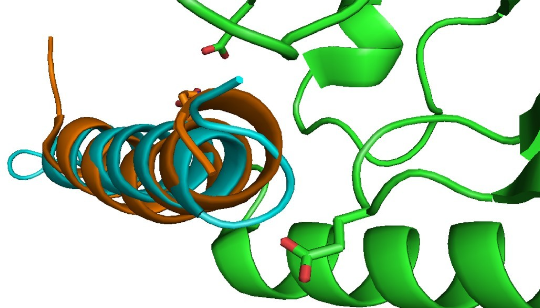A collaborative research project by scientists at Indiana University in Bloomington and the German Research Center for Environmental Health at Munich is reporting that a new treatment they have developed is capable of essentially curing obesity, adult-onset diabetes, and associated lipid abnormalities, disorders that the United Nations and the World Health Organization have declared to be among the greatest medical challenges facing modern society. The innovative treatment developed by the research team has manifested glucose sensitivity improvement, appetite reduction and calorie burning enhancement In animal models.
 The treatment is based on a new peptide, consisting of three molecularly-integrated gastrointestinal hormones, which in combination, acts on receptors of insulin-stimulating hormones and is thereby able to reduce blood sugar levels in patients suffering from obesity or type 2 diabetes. In preclinical trials, this combo proved far more effective at lowering blood sugar levels and reducing body fat than all existing drugs, according to the findings of the research team co-led by IU Distinguished Professor of Chemistry Richard DiMarchi and Matthias Tschöp, director
The treatment is based on a new peptide, consisting of three molecularly-integrated gastrointestinal hormones, which in combination, acts on receptors of insulin-stimulating hormones and is thereby able to reduce blood sugar levels in patients suffering from obesity or type 2 diabetes. In preclinical trials, this combo proved far more effective at lowering blood sugar levels and reducing body fat than all existing drugs, according to the findings of the research team co-led by IU Distinguished Professor of Chemistry Richard DiMarchi and Matthias Tschöp, director  of the Institute for Diabetes and Obesity at the German Research Center for Environmental Health, a professor at Technische Universitt München (TUM) and an Adjunct Professor at Yale University in New Haven, Connecticut, as well as Founding Editor-in-Chief of the journal Molecular Metabolism. The new findings were published this month in the journal Nature Medicine.
of the Institute for Diabetes and Obesity at the German Research Center for Environmental Health, a professor at Technische Universitt München (TUM) and an Adjunct Professor at Yale University in New Haven, Connecticut, as well as Founding Editor-in-Chief of the journal Molecular Metabolism. The new findings were published this month in the journal Nature Medicine.
Last year the team announced success demonstrated in preclinical testing by a peptide combining the properties of GLP-1 and GIP, endocrine hormones that originate in the human digestive tract where they regulate food intake and various metabolic processes, in treating adult-onset diabetes — ground-breaking research for which a team of chemists, pharmacologists and hormone and cancer researchers led by Dr. Tschöp was awarded the 2014 Erwin Schrödinger Prize, an interdisciplinary research honor that includes €50,000 in prize cash that winners can use as they please.
 The findings of the research team, which included Matthias Tschöp, Brian Finan, and Kerstin Stemmer (all of the Institute for Diabetes and Obesity at the Helmholtz Zentrum München) and Indiana University’s Richard DiMarchi, demonstrated that metabolic regulation in the brain can be modulated by the action of natural gut hormones targeting cell membrane receptors that have been engineered to carry small steroids known to act at the cell nucleus. Drs. DiMarchi and Tschöp hoped that these “turbo-charged hormone hybrids” would only deliver their steroid payloads inside cells, where their specific peptide receptor was expressed at the surface.
The findings of the research team, which included Matthias Tschöp, Brian Finan, and Kerstin Stemmer (all of the Institute for Diabetes and Obesity at the Helmholtz Zentrum München) and Indiana University’s Richard DiMarchi, demonstrated that metabolic regulation in the brain can be modulated by the action of natural gut hormones targeting cell membrane receptors that have been engineered to carry small steroids known to act at the cell nucleus. Drs. DiMarchi and Tschöp hoped that these “turbo-charged hormone hybrids” would only deliver their steroid payloads inside cells, where their specific peptide receptor was expressed at the surface.
The new molecule described in the Nature Medicine paper adds a third active hormone to the combination — glucagon. This molecular cocktail delivers steroid hormones such as estrogen selectively to cells that affect metabolism, yet not to cells that could suffer from side-effects in estrogen-sensitive reproductive organs like the uterus. Happily, these hybrid gut peptides had no observed impact on growth of estrogen-sensitive tumors, indicating that the collaborating scientists have succeeded with targeted steroid delivery.

“This triple hormone effect in a single molecule shows results never achieved before,” says paper co-first author Brian Finan, a scientist at the Helmholtz Diabetes Center in Germany, who earned his doctorate in biochemistry in Dr. DiMarchi’s lab at IU, in an IU release. “A number of metabolic control centers are influenced simultaneously, namely in the pancreas, liver, fat depots and brain.”
In building these novel single-cell molecules with their triple-hormone action, the research team discovered that they could reduce body weight in lab rodents by about 30 percent, which is almost twice as much as had been achieved with the previous the GLP-1/GIP double hormone combo. These molecules are categorized as triple agonists — that is: three molecularly combined hormones capable of binding to and activating receptors in order to produce desired biological responses.
“This peptide represents the first rationally designed, fully potent and balanced triple agonist ever achieved in the treatment of any disease,” Dr. DiMarchi observes. “The benefits of the previously reported individual co-agonists have been integrated to a single molecule of triple action that provides unprecedented efficacy to lower body weight and control metabolism.”
In the Nature Medicine paper, the research team describes their latest results as “unparalleled” in comparison with earlier tests using the three hormones both alone and combined as co-agonists declaring it a clear demonstration that the combination of GLP-1, GIP and glucagon can yield improved therapeutic effects.
The triple hormone therapy specifically targets three respective receptors of GLP-1, GIP, and glucagon in equal measure. While GLP-1 and GIP mainly contribute to insulin activity enhancement and blood glucose reduction. GLP-1 also diminishes appetite, while glucagon predominantly increases the long-term rate of calorie burning and enhances liver function.
Despite almost-epidemic increase in rates of obesity and type-2 diabetes in recent years, the researchers note that almost no new pharmacological therapeutic approaches to treatment have been developed. And although it will be a while before their combination peptide therapy can be deployed as an approved therapy method, this novel multifunctional agent approach demonstrates the possibility of designing personalized therapies to treat persons afflicted with type-2 diabetes.
Human clinical trials of the peptide are now being managed by the Switzerland-based pharmaceutical company Hoffmann-La Roche AG
(Roche), which also co-authored the Nature Medicine paper. Inventions associated with this research have been licensed by the Indiana University Research and Technology Corp. through to Marcadia Biotech Inc., which was acquired Roche in 2010.
Other members of the team of researchers affiliated with IU and Dr. DiMarchi’s lab include co-first author Bin Yang as well as Joseph Chabenne, Vasily Gelfanov, David Smiley and Ma Tao.
Sources:
Indiana University
Helmholtz Diabetes Center
Institute for Diabetes and Obesity
German Research Center for Environmental Health
Image Credits:
Indiana University
Institute for Diabetes and Obesity

